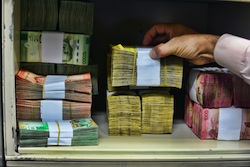Over $4 billion is laundered in Costa Rica every year, according to a government official, where a high degree of financial openness combined with the country’s growing role in the regional drug trade has created conditions ripe for money laundering.
Mariano Figueras, the head of Costa Rica’s intelligence agency, known as the DIS for its Spanish acronym, said that $4.2 billion is laundered in Costa Rica every year, reported Diario Extra. The crime is so prolific, Figueras said, that “everyone in Costa Rica sees money laundering every day and in different forms.”
Much of the money laundering in Costa Rica is channeled through the country’s nascent construction industry — when criminal organizations want to bring money into the legitimate financial system they tend to buy real estate or invest in construction, according to Diario Extra. Financial institutions, casinos, and currency exchange houses are also used to wash illicitly obtained income.
Figueras also noted the role of Costa Rica as a transshipment point in the regional drug trade — the fact that the country lies squarely in the middle of drug routes moving from South America to the United States and money flowing back down, represents a “threat” to the Costa Rican economy. The amount of illegal money swirling around is a threat compared to the relatively small size of the national economy.
InSight Crime Analysis
Figueras has finally put a number to what has long been a concern in Costa Rica. Like its southern neighbor Panama, which has the well-deserved reputation as Latin America’s money laundering hub, Costa Rica has a relatively open financial system, plenty of cash floating around the tourist sector, and profits from the growing drug trade that traffickers try to legitimize. Money laundering in Costa Rica is mostly connected to criminal organizations and the drug trade, which InSight Crime found in a 2011 investigation, as well as arms and human trafficking activities.
In one notable case in 2013, US law enforcement shut down a Costa Rica-based online currency exchange called Liberty Reserve, which prosecutors said was the “bank of choice for the criminal underworld.” A $6 billion business, Liberty Reserve was one of the largest online money laundering operations in history. The owner was able to establish the business in Costa Rica by marrying a Costa Rican citizen, but the exchange likely remained operational due to the country’s lax regulations for online businesses.
SEE ALSO: Coverage of Costa Rica
Costa Rica has since tried to improve its anti-money laundering (AML) regulations, submitting to an audit from the Financial Action Task Force for Latin America (GAFILAT) in January, according to the Tico Times.
In its 2015 International Narcotics Control Strategy Report (pdf), the US State Department noted Costa Rica has enacted all but two of the 21 recommended regulations designed to combat money laundering. Panama only lacked three of those regulations, but both remain on the State Department’s list of countries of “primary concern” for money laundering.

